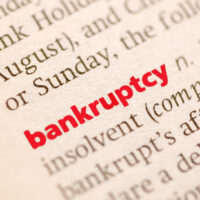Bankruptcy And Intellectual Property

The goal of bankruptcy is to discharge your debts while keeping as much of your property as possible. But when it comes to property, we often think of physical property, and give little thought to property that can’t be touched—such as intellectual property (IP).
What is IP?
IP is most often thought of as copyright, patents and trademarks. Generally, the things you create, make, or design are your intellectual property. The level and extent to which they are yours, or to which you can protect them, is an issue for intellectual property law. But IP is property, and you should know what to do with IP should you opt to file for bankruptcy.
What’s the Value?
Remember that although registering your IP with the government will give you certain legal rights, you don’t have to register your IP with the government for it to have a value. And if it has value, it either needs to be exempted, or else it can be taken and sold by the bankruptcy trustee.
In most cases, IP doesn’t become a big issue in bankruptcy issues because most of our IP has little or no value. That novel you wrote, the gorgeous paintings you make, the character you created, or the method you use for building furniture may all be IP, and they may all have a value to you. But that doesn’t mean they have any value in the open market.
Where IP does come into play is if you own a logo, patent, or copyright that the trustee senses could be of some value. Or, where you have some demonstrated sales or business related to or in connection with the IP.
Toni Braxton’s IP
Take singer Toni Braxton. When she filed for Chapter 7 bankruptcy, her songs were taken by the bankruptcy court and sold. Other people then owned her songs—her IP—and could profit off of them, instead of her. Your IP may not be as valuable as Braxton’s were, but if someone can make money from your creations, the IP may have a value.
Disputed Value
In some cases, the value of the IP is in doubt. This makes a difference—if your IP is worth a lot of money, and you try to exempt it, you could use up all of your exemptions. If your IP is worth nothing, you may not have to use an exemption on it, as the trustee may just abandon it, which frees up your exemptions to use on other things.
The trustee may want to see business and sales records, as well as promotional material, to see if your IP is recognized by the general public, used by the public, or whether you have sales based on your logo. Certainly, if you are expecting revenue from your IP in the future–such as an anticipated licensing deal, or book deal–the IP could have significant value, in which case a Chapter 11 or Chapter 13 may be a better bankruptcy option for you.
Call the West Palm Beach bankruptcy lawyers at Kelley Kaplan & Eller at 561-264-6850 for help and to see what will happen to your property should you file for bankruptcy.
Resource:
law.richmond.edu/academics/clinics-skills/in-house/ip-clinic/pdf/doclib-memo-bankruptcy-and-ip.pdf



